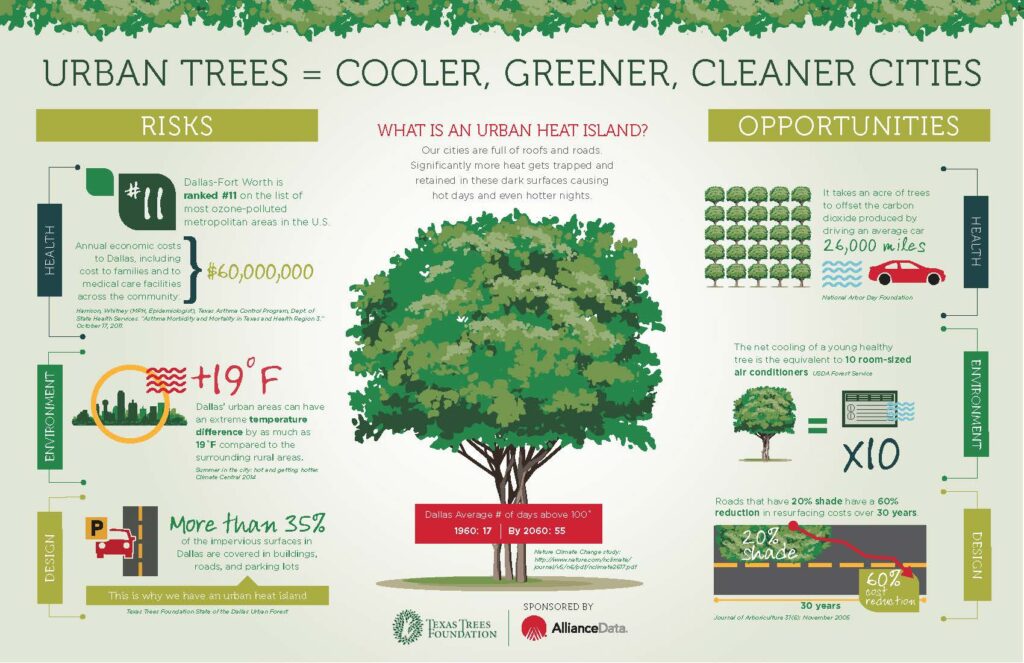A Study of Dallas' Urban Heat Island Effect from August 2017
Texas Trees Foundation’s Urban Heat Island Management Study from August 2017 is a year-long study of the impacts and implications of air temperatures at the neighborhood level. Most notable among them: Dallas is heating up faster than every city in the country except for Phoenix.
 The Urban Heat Island Management study and ensuing report was completed by Dr. Brian Stone, Professor, School of City and Regional Planning, Georgia Institute of Technology, and author of The City and the Coming Climate – Climate Change in the Places We Live. The report determined, “Cities do not cause heat waves – they amplify them. Human activities on climate at the city/regional scale, accounting for both land surface changes and emissions of greenhouses gases, may be twice as great as the impacts of greenhouse gases alone.” Dallas, with 35 percent impervious surface (i.e., rooftops, parking lots, highways, etc.), is hot – and getting hotter. Urban areas retain heat in the buildings and pavement and are up to 15°F warmer than rural areas where trees and open space are more prevalent.
The Urban Heat Island Management study and ensuing report was completed by Dr. Brian Stone, Professor, School of City and Regional Planning, Georgia Institute of Technology, and author of The City and the Coming Climate – Climate Change in the Places We Live. The report determined, “Cities do not cause heat waves – they amplify them. Human activities on climate at the city/regional scale, accounting for both land surface changes and emissions of greenhouses gases, may be twice as great as the impacts of greenhouse gases alone.” Dallas, with 35 percent impervious surface (i.e., rooftops, parking lots, highways, etc.), is hot – and getting hotter. Urban areas retain heat in the buildings and pavement and are up to 15°F warmer than rural areas where trees and open space are more prevalent.
The ramifications of urban heat adversely affect public health, longevity of infrastructure, public opinion, and our economy. With rising temperatures come higher costs for energy and a threat to our energy supply.
Key findings from the study include:
- Sustained High Temps. Hottest areas of Dallas measured an AVERAGE HIGH of 101°F and LOW of nearly 80°F for five full months of the year.
- Heat Kills. Heat-related deaths peaked at 52 in 2011 in Dallas County. Heat-related deaths in the United States account for more deaths annually than all other natural disasters combined.
- Trees Cool. Tree planting in the hottest areas with high density residential was found to reduce deaths by more than 20 percent by merely dropping temperature alone.
Janette Monear, Texas Trees’ chief executive officer, remarked, “Our foundation is focused on making spaces cooler, greener and cleaner, and data has long affirmed that trees are vital to achieve this laudable and critical goal. The study we have released today is a wake-up call for all of us who call Dallas and North Texas home: We must act now to mitigate the urban heat island effect for the sake of our health, the economy and viability of our community. North Texas is seeing unprecedented growth, and with growth comes new buildings, roads and parking lots. It’s imperative that we come together to balance the grey with the green to ensure North Texas is a desirable place to live and work.”
Corporate partners like Alliance Data, Wells Fargo, and American Forests who funded the study understand the ramifications of urban heat to their bottom line.
“With a dual perspective from my seat as Chairman of the Board for Children’s Health System of Texas, and as the leader of a Fortune 500 company headquartered in North Texas, the economic impact of the rising temperatures in Dallas has never been more at risk,” said Ed Heffernan, President and Chief Executive Officer, Alliance Data. “We know from our partnership with Texas Trees Foundation and data from the Urban Heat Island study that health is directly impacted when temperatures increase and air quality declines. Childhood asthma rates are at an all-time high, with nearly 10 percent of all Dallas children suffering from asthma. We care about the health and well-being of our associates, which is why Alliance Data funded this study and why we’re committed to standing with Texas Trees Foundation to make a difference.”
Texas Trees Foundation’s study offers cost-effective solutions to making Dallas one of the coolest cities in the country. Tree planting in concert with reflective pavement and roofing materials are the most cost-effective ways to manage the urban heat island effect.
Together with area municipalities, corporate leaders and non-profit partners, Texas Trees Foundation strategically plants trees in parks, school yards, along streets and other public rights-of-way and provides urban forestry consultation services to create a better quality of life throughout North Texas.

Urban Trees = A Cooler Future For Dallas
Our latest Urban Heat Island infographic highlights the benefits of trees in Dallas, resulting in a cooler and greener future for the city. The stats and figures on this infographic point out the present-day status of Dallas in relation to heat, in comparison to the benefits of greens resulting in a greener tomorrow.

